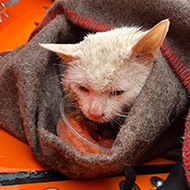
The cat, known as Icicle, had become stranded on the River Bure.
A cat has been rescued by the Great Yarmouth and Gorleston RNLI volunteer crew after becoming stranded on the river wall on the River Bure.
The cat, later discovered to be named Icicle, had been found on a ledge on the river wall, and was completely stuck there.
After a concerned passer-by noticed the cat, the RNLI was informed, and immediately made its way to the cat on the charity's inshore lifeboat, John Rowntree.
Just before the crew arrived, Icicle had fallen into the river – but thankfully the crew spotted him, and were able to gently pull him out of the water to safety.
A warm blanket was waiting for the nervous cat, who seemed alert but very cold when the crew checked him. After arriving on shore, Icicle was taken to the RSPCA to be properly checked and cared for.
RNLI Helmsman Dave Kilpatrick said: “Once in the lifeboat the cat was wrapped in a blanket and kept calm. He seemed pleased to see us.
“Once on dry land he was given some salmon from the fish shop, which he enjoyed.
“The station has since learned that the cat is called Icicle and he was collected by his loving owners very soon after he had been taken to the vets. He is back home safe and sound.”
Image (C) RNLI Gorleston



 The RCVS has announced a new version of its 1CPD mobile app, with enhanced features for veterinary surgeons and veterinary nurses to record their continuing professional development.
The RCVS has announced a new version of its 1CPD mobile app, with enhanced features for veterinary surgeons and veterinary nurses to record their continuing professional development.